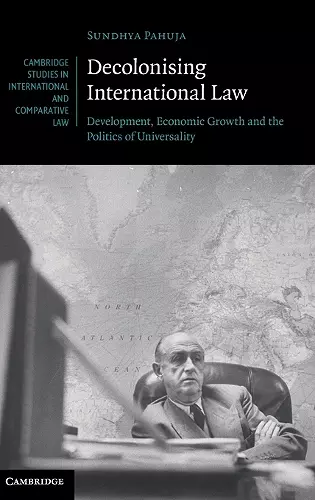Decolonising International Law
Development, Economic Growth and the Politics of Universality
Format:Hardback
Publisher:Cambridge University Press
Published:29th Sep '11
Currently unavailable, currently targeted to be due back around 15th April 2025, but could change
This hardback is available in another edition too:
- Paperback£30.99(9781107657472)

Sundhya Pahuja explores how the concept of development forecloses international law's promise of global justice.
Decolonising International Law unravels the imperial and emancipatory nature of international law, showing how the idea of economic growth forecloses law's promise of justice, and how the concept of development interacts with the structure of international law to maintain global inequality.The universal promise of contemporary international law has long inspired countries of the Global South to use it as an important field of contestation over global inequality. Taking three central examples, Sundhya Pahuja argues that this promise has been subsumed within a universal claim for a particular way of life by the idea of 'development'. As the horizon of the promised transformation and concomitant equality has receded ever further, international law has legitimised an ever-increasing sphere of intervention in the Third World. The post-war wave of decolonisation ended in the creation of the developmental nation-state, the claim to permanent sovereignty over natural resources in the 1950s and 1960s was transformed into the protection of foreign investors, and the promotion of the rule of international law in the early 1990s has brought about the rise of the rule of law as a development strategy in the present day.
'This important and timely book is thoroughly researched, methodically written, and both instructive and convincing.' Muin Boase and Mansur Boase, European Journal of International Law
'This book is a critical, thought-provoking and well-written account of how the post-Second World War international law and institutions have been used by the West (an imagined community itself) to construct and impose a new rational truth based on particular values, norms and socio-political organisations that were defined as universal … The core part of the book is a very lucid analysis of three cases in which relevant concepts and processes defended by the Third World with a potentially destabilizing nature, in the end were captured by the West and turned into instruments at its service rather than as catalysers of change.' Felipe Gómez Isa, Peacebuilding
- Winner of Certificate of Merit, American Society of International Law 2012
ISBN: 9780521199032
Dimensions: 235mm x 160mm x 20mm
Weight: 630g
318 pages